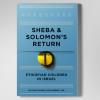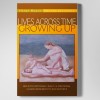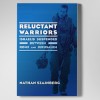9/4/06 Outside Qadesh Barnea
For all the 535 km. biked from Jerusalem to Eilat, for all the landscape, for all the blazing desert, which felt as if at times heat blasted from earth’s core, roasting us ventrally, for all this and more, but a few moments remain scorched into memory, and a few people, in fact, two, remain memorable.
By day three, we are cleared by the military to ride the Philadelphii road, the coarsely gravelled road parallel to the Egyptian border. We are warned. If you need to piss, face away from the Egyptians, as they may take a forward-facer as offensive and shoot in return. But, facing northwards, the pisser contends with the prevailing southerly winds.
Warning. We will climb 400 meters to Qadesh Barnea, where Abraham and Sarah paused on their route to Egypt, where Moshe paused with tens of thousands of ex-slave Jews on return from Egypt, waiting to hear from the dozen spies’ (a prince from each tribe) report on the land of Canaan from which these Jews had been absent for four hundred years. Then, we will descend slightly to begin the one kilometer ascent to Mount Harif (Mount Spicy), highest point in the Negev.
I feel my heart would burst as I snake the last few meters to Qadesh Barnea. But I also know that if I dismount, I won’t remount. I do not look upwards, but keep nose to wheel, occasionally slaloming to make the upward ascent less steep. This ascent gives new meaning to aliyah. Oddly, it is the terribly bad, unmusical tom-tomming, of the crew above that gives me impetus, if not hope, that I can arrive.
I stand on Qadesh Barnea, looking downward and north, into Israel, a landscape not so different than what Moshe saw: shaley shoulders descending to the baked, barren desert, of multiple soft, pastel hues, dead to the eye. No life. To imagine a land flowing with milk and honey takes much imagination, much hope, or at least a belief in a certain G-d. Perhaps, it also took Moshe’s belief in this rag-tag passel of people that they could find or create such a land. No, from here, after a heart-bursting climb, I see more a land that consumes its inhabitants. I am no Moshe at this moment, certainly no Caleb nor Joshua.
We will eventually turn north, taking an indirect route to Eilat, stopping at Machtesh Ramon, shabbating a day, before we descend into the more G-d-forsaken Arava, a deeper, more desolate desert, with a string of kibbutzim necklacing north to south. A night there, a brief rebellion by the riders against the fund-raisers, with our insisting on leaving much earlier to avoid riding in the midday sun, before we descend to Eilat.
But before this detour north to the Machtesh, before the descent to the Arava, before our gentlemanly revolt, I wish to tell you of two remarkable men, David Palmach and Lt. Itzik P. whom we meet before we ascend Qadesh Barnea and the Lt. at our lunch on the military base. He calls himself Palmach, not his moniker at birth. His renaming he preforms at age eighteen to honor the Palmach, the predecessor of the Hagannah. He arrives from Morocco at age two, becomes an Israeli by eighteen. Now, he lives on Nitzanim, along with five families and a gaggle of adolescents: lone teen emigres from the former Soviet Union, Ethiopian kids who need to leave home to become Israeli.
Nitzanim, named after a delicate flower that announces early spring is the ironic name of this desolate outpost at the corner of Israel, a stone’s throw from Palestinian Gaza and a bullet away from Egypt. He is proud to announce that the brackish ground water, which they have learned to desalinate, could serve thousands of inhabitants for one hundred years: so he told a visiting Indian diplomat. Unfortunately, the next morning the water of a hundred years couldn’t flow; massive jugs are brought in for breakfast. They experiment with raising dates and assorted foods on brackish water; a futuristic, Jules-Vernish contraption that greets us before we see the settlement is part of their solar water system. Their major goal, however, is to help teens become Israelis.
He is remarkably short, this triathelte. Announces at teh start that he won’t speak of himself, but of his redoubled efforts to save youth, redoubled since his fifteen year old daughter’s death in a fall near Ben Gurion’s desert grave. He will convert mourning to action. His remaining son, I will tell you of,and the miracle that David Palmach believes his son has wrought. With G-d’s help, says this head-covered father.
His daughter was on a field trip with teens, learning the land, hiking, rock-climbing, camping. There she died. Too long to get a helicopter in to the rocky outcroppings. He has slides of her.
His son, serving in the armored corps in Gaza, is called back to learn about his sister’s death. As the only remaining child, the army won’t send him back to Gaza. But the son has his own ideas. Asks to retrain as an aviator. Graduates from helicopter training. David Palmach shows us his son’s Cobra. A few weeks back, a girl falls in the Judean Desert. The brother flies in to save her life.
This is David Palmach’s sense of redemption. Yes, he continues with slides of the teens in the programs, teh famous visitors who will come for a few hours, or a day, from Arik Sharon to some U.N. guys. But what reemains in memory is how David Palmach and his son have tried to transform their tragedy into the world’s betterment. Small betterments: some teenagers learning about solar energy, learning Hebrew, learning sports, or saving a fallen girl’s life.
We are all exhausted that night. But no one leaves David Palmach’s talk. For it is his life that speaks.
Lt. Itzik is proud that he learned his English in Brooklyn when he was ten, eleven. Looks forward to practicing; asks us to correct him. Which we don’t, as we are too entranced by what he says, by what he does, than how he says it.
We had been delayed entrance to the base from the Philadelphii Road: unclear to the command who gave us permission to ride this military trail; unclear if we had security clearance to enter. Awkward period as we stand astride our bikes in the midday sun; nowhere else within kilometers to find shade, eat. Finally granted permission, we invade
the provence of 18 to 20 year-olds. We are given leeway to use the lu, if only one can find it. A trough — filled with old toothpaste tubes, some paper, old razers — is for washing; showers with one tepid water tap and no curtains; toilets without lids and certainly no paper. A young fellow ferrets out a roll and tosses it up to me as I am enthroned. I once was taught by a meticulous woman that one can use such seatless wonders by planting each foot on the rim and
squatting over. But, I am no a squatter. Water over the head afterwards is a relief.
This is feral dog-land. Curs all over. They rule, whatever these humans may fancy. They roam in packs and a young soldieress prizes a puppy cradled in her arm. Our bike flat fixer, Charlie, blasts Bruce Springsteen from his truck cab at all stops, wears an Australian outback hat, bolo tie, Snakeskin boots, has taken to two wheels before our lunch break and thinks he can tour the base. The dogs think otherwise and several packs chase him as he pedals furiously for the gate, hoping that someone will let him out before the curs get him. The mother dog is particularly ferocious, perhaps
sensing that he, unlike the soldieress, is not a puppy cuddler. He ditches the bike and leaps head-first into the cab of his truck, into Springsteen’s arms, or blasts.
By this, day three, I and a few others become particular about our victuals. I toss much of the bread, work at the humus and vegetables, suck salt off peanuts and spit out the latter. Much water. A few fruit. Take just enough dates to eat later, before send-off. We have a few moments of lolling beneath a corrugated roof of shade before Lt. Itzik is introduced.
I am in no mood for lectures, demonstrations, education. Just tell me the next leg, the distance, the terrain, the percent inclines (and any promising descents). I have become a two-wheeled laconic Sergeant Friday: Just the facts, mam. Want Charlie to check my chain derailers should he ever deign exit his cab, face the curs.
But, I am entranced and grateful once Lt. Itzik starts.
We sit campfire style around him as he stands, rifle slung diagonally over shoulder. He is tall, swarthy, wears a kippah on closely-cropped hair. His heavily accented English shows little trace of Brooklyn a decade ago.
He is really from a tank brigade, called down from Gaza to help out here. Just temporary. He has pride about tank battalion, but also sense of responsibility to get matters in place here. What matters? The Egyptian border is porous. Unlike Gaza, with various warning systems and such on the fence, unlike the West Bank’s new fence, with both electronic warning systems, carefully landscaped rims of sand to reveal footprints and more, the Egyptian border has this modest, rickety, rusted chainlink. Doesn’t bother the Egyptians — the illegal trafficking of drugs and whores — as the penetrance is from there to here: no one seems to want to penetrate Egypt from Israel. They do nothing to interdict the human sex slave traffic: your problem, not ours is the unspoken Egyptian attitude. But, arms trafficking is new and more problematic. Much of the trafficking is done by Bedouins who know the land, the paths, the secrets of this
desolation. But, arms are treacherous to Israel; end up in the West Bank, Gaza.
His job description runs something like this. Given some Intelligence reports, he heads out with a small squad in the night; disappears to somewhere — perhaps on this side of the border, perhaps not, for three days and nights. At night, lie down in shallow pits, cover oneself with a camouflage sheet.
Wait.
Capture.
Return for a few hours to shower, make sure his boys clean up their living areas, clean their guns, then back into the field. He is matter-of-fact about this; no bravado, but yes a sense of responsibility and of the importance of his tasks for Israel. He brightens a bit when asked about after the army. Perhaps the requisite trip abroad — India or South America, maybe back to exotic Brooklyn. Then to college. He feels a bit too young, he says to worry about what happens beyond that.
A bit too young, but too old, he sounds. Altneuland, paraphrasing Herzl. This fellow who lies on his belly at night, waiting for smugglers of drugs, of women, of arms, seems both youthful, yet heavy-shouldered.
And for all the wheeling I have done, it is Itzik and David Palmach whose inner landscapes remain most alive. When the twelve spies returned to Moshe, only Joshua and Caleb found hope in the land — milk, honey and such. One of the other ten spies said that next to the giant Canaanites, the Israelites look like ants, grasshoppers. But, these Israelites — these two — look like giants.
Copyright 2006, N. Szajnberg

 utdoor garden about three blocks down Telegraph (I think past Moe’s). On return, I left a bundle of dough at Cody’s and a bit more at Moe’s.
utdoor garden about three blocks down Telegraph (I think past Moe’s). On return, I left a bundle of dough at Cody’s and a bit more at Moe’s.

